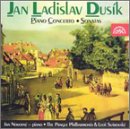| All Artists: Jan Ladislav Dussek, Leos Svarovsky, Prague Philharmonic Orchestra, Jan Novotny Title: Jan Ladislav Dusik: Piano Concerto; Sonatas Members Wishing: 0 Total Copies: 0 Label: Supraphon Release Date: 2/25/2003 Album Type: Import Genre: Classical Styles: Chamber Music, Forms & Genres, Concertos, Sonatas, Historical Periods, Classical (c.1770-1830) Number of Discs: 1 SwapaCD Credits: 1 UPCs: 675754577926, 099925365929 |
Search - Jan Ladislav Dussek, Leos Svarovsky, Prague Philharmonic Orchestra :: Jan Ladislav Dusik: Piano Concerto; Sonatas
 | Jan Ladislav Dussek, Leos Svarovsky, Prague Philharmonic Orchestra Jan Ladislav Dusik: Piano Concerto; Sonatas Genre: Classical
|
Larger Image |
CD Details |
CD ReviewsOwn this record if you love Dussek's piano music Dexter Tay | 06/05/2006 (4 out of 5 stars) "The admirable Concerto for piano and orchestra in E flat is probably the latest of Dussek's piano concertos to be recorded on disc, and how well this is being done! The sound is full and impeccable, the playing well-balanced and clear. This Concerto, completed in 1810, was perhaps Dussek's most representative work in the genre that conjoins him with his contemporaries - Hummel, Field, Weber and Cramer, figures that we have since come to know as the proto-Romantics.
While the the Concerto is still perceptibly Classical, the harmonic innovations and writing for certain orchestra parts (i.e. woodwinds) are clearly proto-Romantic. Pianistically Dussek strikes a close chord with Hummel in its stylistic and technical veins, while harmonically it anticipates Field. The full-blooded chords of the opening piano solo points to Beethoven's "Emperor", albeit more subtly emphatic than overtly grandiose. While I would recommend anyone to buy this disc for the sake of the Concerto alone, bundled with the best known of Dussek's Sonatas, this disc is a compelling buy. Novotn's interpretation might come across as somewhat insipid for the Dussek enthusiast who prefers his Romantic avatar; in the A flat his pedalling is sparse to the minimum, and his tempi, though allowing for some rubato, follows through in strict time for the faster passages. This interpretation is by far the most "Classical" I've heard; strict periodists would not frown at this take, however I'm quite sure most Dussek lovers would prefer the more Romantic profusions of say Markus Becker on CPO. The slow movement is quite awfully mechanical and turgid - listeners more accustomed to the flowing cantilena lines, private affectation or the intense emotional outpourings of other interpretations could be quite gravely put off here - emotion is sorely lacking in what's probably the most moving and beautiful of Dussek's slow movements. In the F sharp minor Sonata, the second movement (played fast) was executed at a much slower pace than with other available interpretations. Novotn's idiosyncracies seemed much more pronounced in the Sonatas than in the Concerto (likewise with Staier) - though for the sheer scope of material present in this disc which showcases Dussek's best, the brilliant sound and the very budget pricing, this disc scores well as a mandatory record for any Dussek collection. " |

 Track Listings (9) - Disc #1
Track Listings (9) - Disc #1